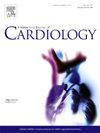口服抗凝剂对房颤患者肾功能的影响。
IF 3.2
2区 医学
Q2 CARDIAC & CARDIOVASCULAR SYSTEMS
引用次数: 0
摘要
背景:肾功能影响心房颤动(AF)口服抗凝药物的药代动力学,可能影响疗效和出血风险。然而,其对不同药物的不同影响尚不清楚。在这项研究中,我们的目的是评估肾功能与房颤患者缺血性和出血风险之间的关系,并按抗凝类型进行分层分析。方法:我们分析了来自DIRECT-Extend注册中心的7239例非瓣膜性房颤患者,这是一个由三个大型注册中心合并的数据集。使用Cockcroft-Gault公式计算肌酐清除率(CrCl),并将其分类为≥50,30至。结果:较低的CrCl与年龄较大,女性和更大的共病负担相关。肾功能受损与较高的缺血性和出血风险显著相关。样条分析显示,随着CrCl的下降,两种风险均持续增加,与出血呈非线性关系。亚组分析显示,在服用达比加群、利伐沙班、依多沙班和华法林的患者中,CrCl降低与缺血性风险之间存在显著关联。较低CrCl水平的依多沙班和华法林明显增加出血风险。在接受阿哌沙班治疗的患者中,没有观察到CrCl与任一终点之间的显著关联。结论:在这个庞大的现实世界队列中,肾功能下降与缺血性和出血风险增加相关,突出了基于肾功能的风险评估在抗凝治疗管理中的重要性。本文章由计算机程序翻译,如有差异,请以英文原文为准。
Clinical impact of kidney function in patients with atrial fibrillation receiving oral anticoagulants
Background
Renal function influences the pharmacokinetics of oral anticoagulants in atrial fibrillation (AF), potentially affecting both efficacy and bleeding risk. However, its differential impact across specific agents remains unclear. In this study, we aimed to evaluate the association between renal function and ischemic and bleeding risks in patients with AF, with analyses stratified by anticoagulant type.
Methods
We analyzed 7239 patients with non-valvular AF from the DIRECT-Extend registry, a pooled dataset of three large-scale registries. Creatinine clearance (CrCl) was calculated using the Cockcroft-Gault formula and categorized into ≥50, 30 to <50, and 15 to <30 mL/min. The primary ischemic endpoint was stroke or systemic embolism, and the primary bleeding endpoint was major bleeding. Cox proportional hazard models and restricted cubic spline analyses assessed associations between CrCl and outcomes, with subgroup analyses by anticoagulant type.
Results
Lower CrCl was associated with older age, female sex, and greater comorbidity burden. Impaired renal function was significantly associated with higher ischemic and bleeding risks. Spline analysis demonstrated a continuous increase in both risks with declining CrCl, with a nonlinear relationship for bleeding. Subgroup analyses revealed significant associations between reduced CrCl and ischemic risk in patients on dabigatran, rivaroxaban, edoxaban, and warfarin. Increased bleeding risk was evident for edoxaban and warfarin at lower CrCl levels. No significant association was observed between CrCl and either endpoint in patients receiving apixaban.
Conclusion
In this large real-world cohort, declining renal function was associated with increased ischemic and bleeding risks, highlighting the importance of renal function–based risk assessment in the management of anticoagulation therapy.
求助全文
通过发布文献求助,成功后即可免费获取论文全文。
去求助
来源期刊

International journal of cardiology
医学-心血管系统
CiteScore
6.80
自引率
5.70%
发文量
758
审稿时长
44 days
期刊介绍:
The International Journal of Cardiology is devoted to cardiology in the broadest sense. Both basic research and clinical papers can be submitted. The journal serves the interest of both practicing clinicians and researchers.
In addition to original papers, we are launching a range of new manuscript types, including Consensus and Position Papers, Systematic Reviews, Meta-analyses, and Short communications. Case reports are no longer acceptable. Controversial techniques, issues on health policy and social medicine are discussed and serve as useful tools for encouraging debate.
 求助内容:
求助内容: 应助结果提醒方式:
应助结果提醒方式:


